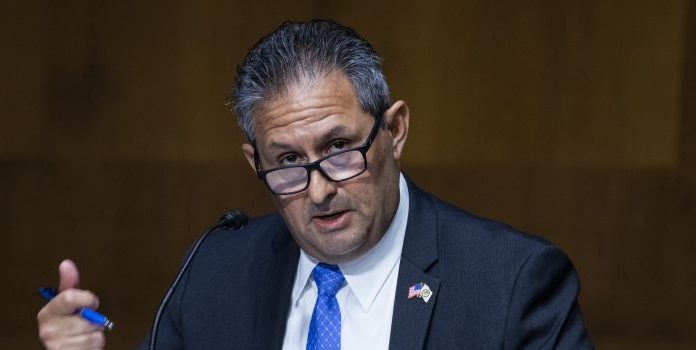(Headline USA) The director of the federal Bureau of Prisons is resigning amid scrutiny over his leadership and a push by radical leftists’ demands for prison and law enforcement reform, which in many cases have been tantamount to eliminating pre-trial detention and releasing criminals from jail.
Michael Carvajal, a Trump administration appointee who’s been at the center of several challenges within the federal prison system, has told Attorney General Merrick Garland he is resigning, the Justice Department said. He will stay on for an interim period until a successor is in place. It is unclear how long that process would take.
His exit comes just weeks after the Associated Press reported that more than 100 Bureau of Prisons workers have been arrested, convicted or sentenced for crimes since the start of 2019, including a warden charged with sexually abusing an inmate.
“We are very appreciative of Director Carvajal’s service to the department over the last three decades,” Justice Department spokesman Anthony Coley said in a statement. “His operational experience and intimate knowledge of the Bureau of Prisons — the department’s largest component — helped steer it during critical times, including during this historic pandemic.”
Congress grabbed the AP stories and used them as a tool to start investigating and prompted increased calls to resign by lawmakers, including Democrat Dick Durbin, chairman of the Senate Judiciary Committee.
In a statement, Durbin said Carvajal “has failed to address the mounting crises in our nation’s federal prison system, including failing to fully implement the landmark First Step Act,” a bipartisan criminal justice measure passed during the Trump administration that was meant to improve prison programs and reduce sentencing disparities.
“His resignation is an opportunity for new, reform-minded leadership at the Bureau of Prisons,” Durbin said.
Carvajal’s tenure included the rampant spread of coronavirus inside federal prisons, a response to the pandemic that was hamstrung by bureaucratic red tape, dozens of escapes, deaths and critically low staffing levels that have hampered responses to emergencies.
The administration had faced increasing pressure to remove Carvajal and do more to fix the federal prison system after President Joe Biden‘s campaign promise to push criminal justice reforms. The Bureau of Prisons is the largest Justice Department agency, budgeted for around 37,500 employees and over 150,000 federal prisoners. Carvajal presided over an extraordinary time of increased federal executions and a pandemic that ravaged the system.
Carvajal, 54, was appointed director in February 2020 by then Attorney General William Barr, just before the COVID-19 pandemic began raging in federal prisons nationwide, leaving tens of thousands of inmates infected with the virus and resulting in 266 deaths.
COVID-19 is again exploding in federal prisons, with more than 3,000 active cases among inmates and staff as of Wednesday, compared with around 500 active cases as of mid-December. All but four BOP facilities are currently operating with drastic modifications because of the pandemic, with many suspending visiting.
Carvajal also oversaw an unprecedented run of federal executions in the waning months of the Trump presidency that were so poorly managed they became virus superspreader events.
Biden administration officials had discussions about whether to remove Carvajal in the spring, after the AP reported that widespread correctional officer vacancies were forcing prisons to expand the use of cooks, teachers, nurses and other workers to guard inmates.
The agency’s staffing levels reached a critical point under Carvajal and officers at several facilities have held protests calling for him to be fired. But Deputy Attorney General Lisa Monaco said recently that she still had confidence in him.
Carvajal, an Army veteran, worked his way up the Bureau of Prisons ranks. He started as a correctional officer at a Texas federal prison in 1992 and was the warden of the federal prison complex in Pollock, Louisiana, before being promoted to regional director in 2016, assistant director in 2018 and director in 2020.
Adapted from reporting by the Associated Press

